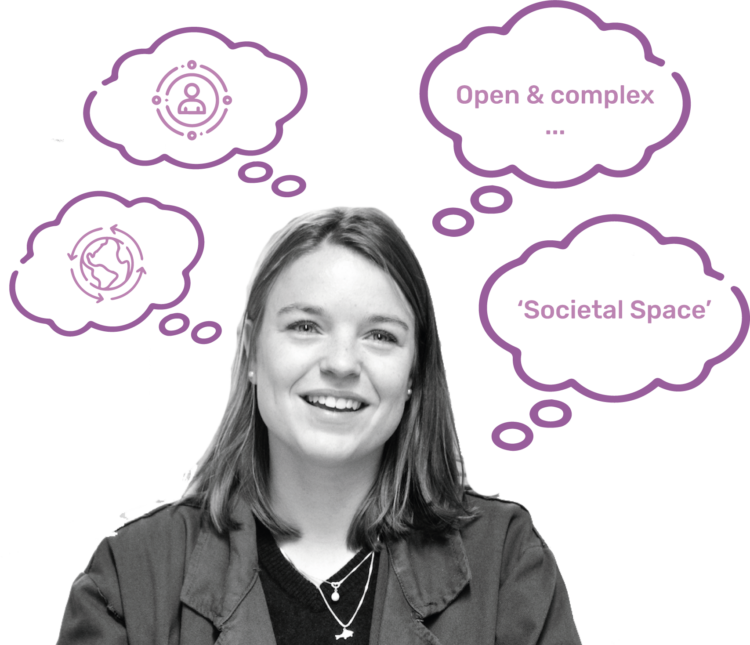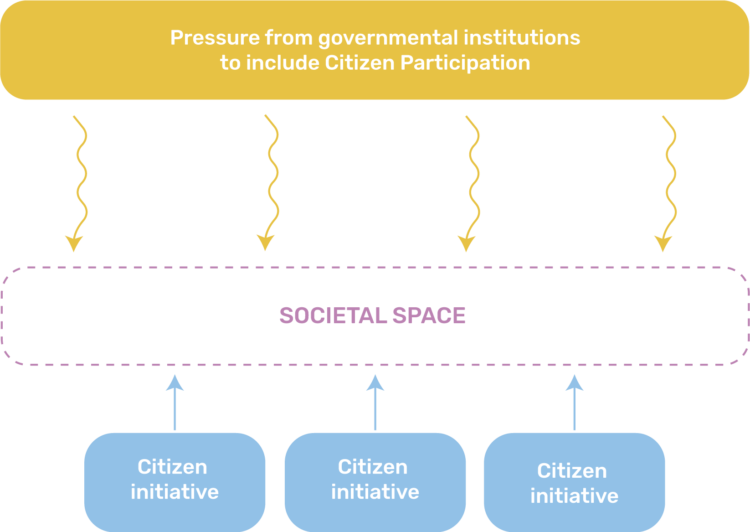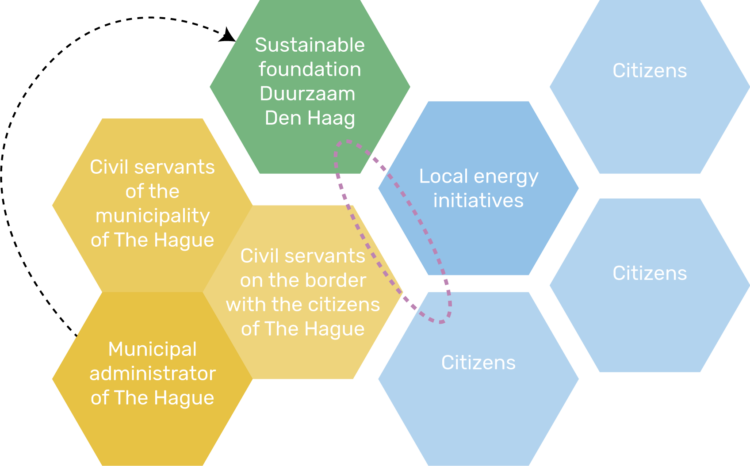From citizen initiatives to citizen participation
Designing a strategy to increase citizen participation in the energy transition through local energy initiatives in The Hague

The energy transition is one of the many challenges we face in our society nowadays. It is an open, complex and interesting combination of meeting the interests of many different people and the implementation of sustainable solutions. This kind of problems are the ones that especially attract Louka as a Double degree master student. In her studies, she tries to bridge the gap between Design and Industrial Ecology, playing with the goal to design on one hand user-centered solutions and on the other hand sustainable solutions. During her internship at the municipality of The Hague she experienced designing (public) services for people while standing beside them. Each project was based on extensive user-centered research in the form of interviews, focus groups, usability research, validations and personas. In her eyes, citizen participation is taking the design of public services to the next level. In this way not only insights used to design solutions can be based on people values and needs, but people can form an opinion, choose and help create solutions for themselves and fellow citizens. No coincidence that citizen participation is seen as the cornerstone of democracy, the so called ‘do-democracy’[1], and that Louka decided to join the PCM Lab to explore how she could contribute to it with her graduation project.
[1] https://drift.eur.nl/cases/doe-democratie-niche-visie-hype/
A transition towards a participatory ‘Societal Space’
Louka would state that at this moment we find ourselves in an interesting transition moment. Citizen participation provides society with a more cooperative attitude towards the way we arrange, develop and innovate. As well the association of Dutch municipalities (VNG) as the European Union is steering towards a participatory society. In this society citizens should be the core of the transitions, take ownership and also receive the benefits. Therefore, the Dutch governmental power is becoming more and more decentralized, foisting municipalities with more tasks and responsibility. At the same time citizens are making themselves heard. They start local initiatives in their neighborhoods and try to bundle citizen power, organizational ability and knowledge. This results in what Louka would call the interesting ‘Societal Space’, where top-down and bottom-up approaches are meeting each other. But she also acknowledges that the way we deal with this ‘Societal Space’ is still ‘under construction’ and developing step-by-step.

Fostering participation through Energy transition initiatives in The Hague
The energy transition is one of the main programs active in the municipality of The Hague, which is also aware of the above mentioned ‘Societal Space’ that is taking shape, especially in cities. If we look at citizen initiatives, we find many of them in the context of The Hague, mostly in the form of local energy initiatives. The potential of these initiatives in scaling the citizen participation is an interesting phenomenon happening in this ‘Societal Space’. The initiatives are naturally formed social groups consisting of citizens, often in the context of a city district or neighborhood. They can represent the voice of a city district or neighborhood and provide multiple values and meanings. The municipality should work with these initiatives, see the advances and stimulate the development of the ‘Societal Space’ if they want to move towards a new form of democracy and participatory society. But how exactly can local energy initiatives contribute to the stimulation and scaling of citizen participation? If we look specifically at the context of The Hague municipality, the following question arises: ‘How can the municipality of The Hague increase citizen participation through local energy initiatives? It’s an open and complex challenge still, one that Louka found herself immediately intrigued by and decided to tackle with her graduation project in collaboration with the PCM Lab.

A third player in the ecosystem
Within the municipality, she works with, Louka distinguishes three types of civil servants: municipal administrators, the ‘regular’ civil servants and the civil servants which are in direct contact with the citizens and citizen initiatives of The Hague. These latter are especially important in Louka’s project, as they work on the border that connects the municipality and the Hague citizens. However, there is also a third player in the field which makes the context of The Hague even more interesting. The foundation ‘Duurzaam Den Haag’ is in fact part of the stakeholder ecosystem around the citizen initiatives. It’s an independent organization, which projects are however funded and commissioned by the municipality. Therefore, it is seen as an extension of the municipality by some of the initiatives. They act as a middleman between the municipality and the initiatives and help to start citizen initiatives. All in all, this leads to as well direct as indirect interactions between the citizen initiatives and the municipality, so important to include in the research.
Fostering a flourishing, balanced ecosystem
During her project Louka will look into the different stakeholder perspectives, the interactions and view that they have on each other. Her research is structured in three phases since she is doing a Double degree thesis. The first phase will dive in the world of local energy initiatives: the operation and development, the different stakeholder roles, the value of the initiatives for citizens (and the municipality) and the relation of these initiatives to citizen participation. The result of this research will lead to a better understanding of local energy initiatives, their opportunities and bottlenecks. An ethnographic approach will support the discovery of useful insights. The second phase will provide insights on the potential of local energy initiatives: the capacity of the initiatives and how representative they are for the citizens in the neighborhoods where they are active, the relation between the initiatives and citizen participation and also possible other negative or positive (side) effects of the initiatives. In the third and last phase a process strategy will be designed on the basis of co-creation workshops and by reframing the situation context. This strategy could also be supported by a service provided by the municipality of The Hague towards the initiatives and/or citizens. Further, it could also include the integration of a new business model around the subsides of the municipality in relation to initiatives. In any case, there are plenty of opportunities to be investigated.

In the end Louka aims to find insights on what the initiatives mean for the citizens, the way they could be supported by the municipality and how they could contribute to increase citizen participation in the city. Overall, the ‘Societal space’ that Louka has in mind should be a flourishing, balanced ecosystem, for as well the initiatives and citizens as the municipality, where both can benefit and support each other. With such a ‘Societal Space’ we will hopefully be more able to make the necessary transition together, in the interest of everyone.